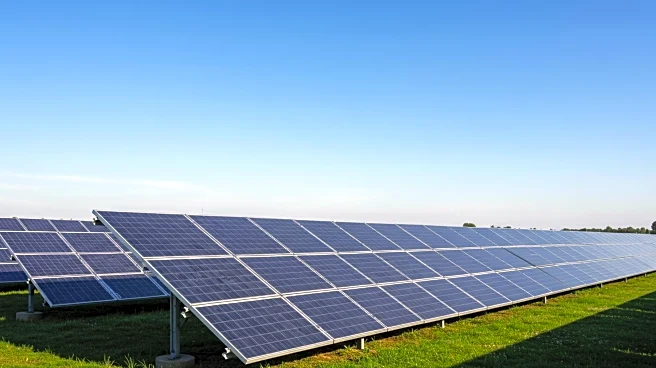What's Happening?
India has reached a significant milestone by achieving 100 gigawatts (GW) of solar photovoltaic (PV) module manufacturing capacity. Prime Minister Narendra Modi praised the development, calling it a key step towards energy self-sufficiency and clean energy adoption. According to the Ministry of New and Renewable Energy (MNRE), the country's solar PV module manufacturing capacity listed under the Approved List of Models and Manufacturers (ALMM) has now reached 100 GW. This marks a major advance in India's efforts to establish a strong and self-reliant solar manufacturing ecosystem, in line with the broader national vision of 'Atmanirbhar Bharat' and the global push for clean energy. Union Minister for New and Renewable Energy, Pralhad Joshi, highlighted the progress, noting the rise from just 2.3 GW in 2014 to the current capacity. The expansion includes both well-established firms and new players, many of whom have embraced high-efficiency technologies and vertically integrated production processes.
Why It's Important?
This achievement underscores India's growing role in the global clean energy transition and its commitment to self-reliance in manufacturing. The increase in solar PV module capacity is expected to boost domestic demand and contribute to international markets, reinforcing India's position as a leader in renewable energy. The development aligns with India's 2030 target of 500 GW non-fossil capacity, supporting the country's efforts to reduce carbon emissions and promote sustainable energy solutions. The growth in manufacturing capacity also reflects the success of initiatives like the Production Linked Incentive (PLI) Scheme for High-Efficiency Solar Modules, which aims to enhance India's solar ecosystem and drive economic growth through renewable energy.
What's Next?
India's continued focus on expanding its solar manufacturing capabilities is likely to attract further investment and innovation in the renewable energy sector. The government may introduce additional policies to support the growth of high-efficiency technologies and encourage more manufacturers to enter the market. As India progresses towards its 2030 energy goals, stakeholders can expect increased collaboration between industry, state governments, and the central government to advance clean energy initiatives and strengthen the country's position in the global energy landscape.
Beyond the Headlines
The expansion of solar PV module manufacturing capacity in India highlights the ethical and environmental dimensions of the country's energy strategy. By prioritizing clean energy solutions, India is taking significant steps to address climate change and reduce its reliance on fossil fuels. The focus on self-reliance also reflects a broader cultural shift towards sustainability and innovation, encouraging local industries to develop technologies that align with global environmental standards.








